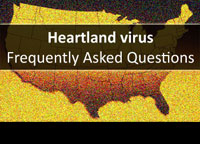
On this Page
- What is a phlebovirus?
- How do people get infected with phleboviruses?
- Where have cases of Heartland virus disease occurred?
- What are the symptoms caused by Heartland virus?
- Who is at risk for infection with Heartland virus?
- How can people reduce the chance of getting infected with Heartland virus?
- How do I know if I have been infected with Heartland virus?
- What is the treatment for Heartland virus disease?
- What should I do if I think someone might be infected with Heartland virus?
- Can Heartland virus cause animals to get ill?
Novel phlebovirus (Heartland virus)
What Do I Need to Know?
What is a phlebovirus?
"Phlebovirus" is the name for a family of related viruses. Viruses in this family are found all over the world. Some of these viruses can cause people to get sick. Most of the phleboviruses that cause people to become ill are passed through the bite of a mosquito, tick, or sandfly. Recently, a new phlebovirus that causes illness in people was discovered in Missouri. The new phlebovirus has been named Heartland virus.
How do people get infected with phleboviruses?
Most of the phleboviruses that cause people to become ill are passed through the bite of a mosquito, tick, or sand fly. It is not yet known how people become infected with the new Heartland virus.
Where have cases of Heartland virus disease occurred?
To date, two cases of Heartland virus disease have been identified. Both patients were residents of Missouri. It is unknown at this time if the virus may be found in other areas of the United States.
What are the symptoms caused by Heartland virus?
The two Missouri residents had a flu-like illness. They had a fever, felt tired, did not want to eat, and had diarrhea. They also had lower numbers of cells that fight infection and help with clotting. At first, doctors thought they had a tick-borne illness called ehrlichiosis. However, they did not get better with medicine used to treat that disease. Special testing determined they were infected with Heartland virus. Both patients were in the hospital for about 10 days. Both have since recovered.
Who is at risk for infection with Heartland virus?
It is not yet known how people get infected with Heartland virus. However, it is likely passed to people through a bite of a tick, mosquito, or other insect. Therefore, people who work outside or participate in outdoor activities, where they are exposed to insects or ticks, may be more likely to get infected.
How can people reduce the chance of getting infected with Heartland virus?
It is not yet known how people get infected with Heartland virus. However, it is likely passed to people through a bite from a tick, mosquito, or other insect. Preventing bites from ticks and mosquitoes may prevent this and other infections. There is no vaccine or drug to prevent or treat the disease.
- When going outside during the warmer months, use insect repellant on exposed skin.
- Look for lotions, sprays, and other products that contain an effective repellant, such as DEET, picaridin, or oil of lemon eucalyptus.
- Products with the ingredient permethrin can be used on clothing.
- Read the label carefully to find out which insects the product repels and how often it should be re-applied. Always follow the directions on the package.
- Wear long sleeves and pants when weather permits.
- Reduce ticks and mosquitoes in the yard.
- Eliminate mosquito breeding sites by emptying standing water from flower pots, buckets, barrels, and other containers.
- Regularly remove leaf litter and clear tall grasses and brush around homes.
- Place wood chips or gravel between lawns and wooded areas to keep ticks away from recreational areas.
How do I know if I have been infected with Heartland virus?
Currently, no tests are routinely available to tell if a person is infected. Tests that will help a doctor diagnose an infection are being developed. Consult your healthcare provider if you have any symptoms that concern you.
What is the treatment for Heartland virus disease?
There is no specific treatment for Heartland virus disease. Antibiotics are not effective against viruses. Supportive therapy can treat some of symptoms. This may include hospitalization, intravenous fluids, and treatment for pain or fever.
What should I do if I think someone might be infected with Heartland virus?
Consult your healthcare provider for proper diagnosis if you have any symptoms that concern you.
Can Heartland virus cause animals to get ill?
It is not yet known which animals can get infected or become ill from Heartland virus. Studies are ongoing to look at this. Consult your veterinarian if your pet or livestock have any symptoms that concern you.
Contact Us:
- Division of Vector-Borne Diseases
- Centers for Disease Control and Prevention
3150 Rampart Road
Ft. Collins, CO 80521 - 800-CDC-INFO
(800-232-4636)
TTY: (888) 232-6348 - New Hours of Operation
8am-8pm ET/Monday-Friday
Closed Holidays - cdcinfo@cdc.gov


